
views
Learning About Hebrew and Judaism

Study Hebrew. You should already have begun studying Hebrew long before your ceremony. If you have not, now is the time to begin. You should aim for enough fluency to be able to read your portion, not recite it from memory. Your synagogue should assign you a tutor. Depending on your congregation, you may be tutored by a cantor, an on-staff tutor, or another teen. Do extra practice online. Websites like duolingo offer free Hebrew lessons. Practice reading Hebrew every day.

Learn about Judaism. If one is available, go to religious school and attend it as if it were a regular school. In order to fully appreciate your Bar or Bat Mitzvah, you need to understand the culture you are a part of. Next time you go to a Passover Seder, really listen to what is being said and ask questions. Join in the discussion, and add your insights to what the Haggadah is talking about. Ask your rabbi questions. For instance, when you shake the Lulav and Etrog, ask your rabbi why you are shaking it in each direction.

Study Torah. The Torah contains all of the teachings and rituals of Jewish culture. You don't have to memorize it or even be able to quote it, you just have to read it and understand what it's saying.
Practicing Your Torah Portion

Choose your Torah portion. When you have set a date for your Bar or Bat Mitzvah, you will learn which portion you will be reading at your ceremony. The weekly portion is often very long, and often you will only be required to learn some of it. Choose a section that is interesting to you. Ask your rabbi what portion will be read during your ceremony. Use this calculator to check which portion you will have: https://www.chabad.org/calendar/bar-bat-mitzvah_cdo/aid/6227/jewish/BarBat-Mitzvah-Date-Calculator.htm

Practice reading your torah portion. When you study, it's best to start with a sheet including vowels, unless you speak Hebrew fluently. If you read or chant it enough, it will become second nature and you'll be able to read the real thing without vowels. Once you are comfortable with the portion, however, make sure you practice with a facsimile of the Torah you are reading so you can get used to the unique handwriting of the scribe who created the Torah. Reading from a sheet that looks similar will also help to calm your nerves about the portion.

Know what your portion means. In your eagerness to learn your portion, it's sometimes necessary to slow down and take a look at what you're actually reading. Try to get to the point where you can translate as you read and actually know what the words mean. It's an amazing experience when you can read and understand your portion as if it were in your native language.

Study your Haftorah portion. The Haftorah portion is usually read at some point after the Torah portion and is from the Books of Prophets. The tropes are very different from the ones in your Torah portion, so you will need to devote time to study them. Make sure you practice your Torah portion as well or you might accidentally start singing your Torah portion with Haftorah tropes!

Discuss everything you will be reading with your rabbi. Your rabbi will be able to illuminate your portion and direct your attention to ideas within it that you may not notice on your own. Ask questions and share your ideas with your rabbi: rabbis love it when young people take an interest in Torah.
Arranging Your Ceremony

Think about your speech. It is customary for the Bar or Bat Mitzvah candidate to give a speech to the congregation. It can be about pretty much anything you want, so long as it relates back to your Torah portion. You might want to include an informal explanation of your Mitzvah project, but you don't have to. Welcome everyone in the crowd. Expand on an idea from the readings of the day. Say what the ceremony means to you, and how you connect with the lesson. Thank your family, your rabbi, anyone else who helped you prepare, and everyone who came to see you.
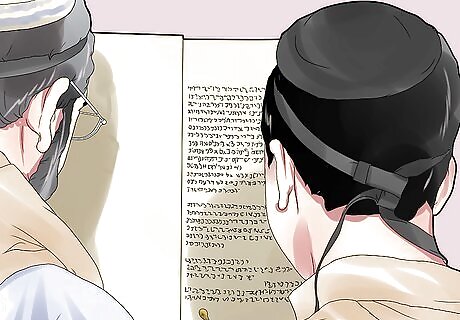
Choose who will do your Aliyahs. Having an Aliyah is a great honor so you should choose your Olehs (people who have an Aliyah) carefully. Usually, you will do the last Aliyah, and there will be six other Aliyahs to give out. The only rule is that the Olehs must be Jewish and must be of age. That is, they must be over 12 if they are women and 13 if they are men.

Pay attention to the ritual of Shabbat services. Going to services is a good idea anyway, but when you're preparing for a Bar or Bat Mitzvah, it's even more imperative. You need to be familiar with the prayers and the stage directions, because you will be doing them yourself during your Bar or Bat Mitzvah. Shabbat services will also give you an opportunity to connect with G-d.
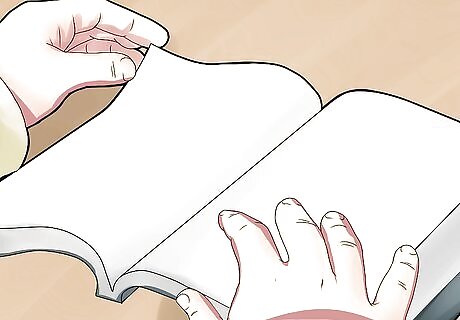
Study the service as a whole. You'll have to be able to do the whole service on the real day, so you need to be very familiar with it. If there are any prayers you are stuck on, ask for help from your rabbi or religious school teacher.

Have a rehearsal if you can. It will be easier for you to sleep the night before if you have a rehearsal a few days before. If possible, have everyone who has a part there, even if it's just a reading. You'll get all of the rough edges smoothed now and your nerves will be calmed during the real thing knowing you've done it before.

Relax the night before. The Friday before, do something fun before going to Shul. Studying at this point is unnecessary. Don't let nerves stress you out too much, or you'll regret it later. You'll be fine, you've been preparing for about a year now. With all that preparation, you're unlikely to forget what to do—and if you do, it'll just be a story you can tell later.
Doing Your Mitzvoth
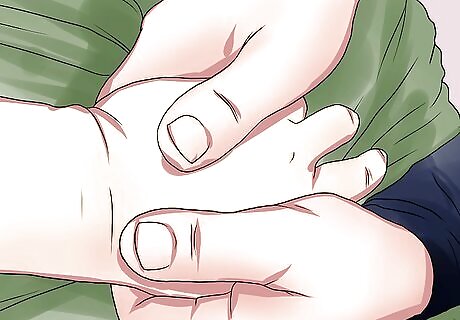
Perform Mitzvoth. Mitzvoth translates as "commandment" and it usually refers to a Jew's obligation to G-d to help others. A mitzvah can be something as small as holding the door open for someone, or as large as starting your own organization to feed the hungry. Doing Mitzvoth shows G-d that you are responsible and are ready to take on the responsibilities of becoming a Bar or Bat Mitzvah.
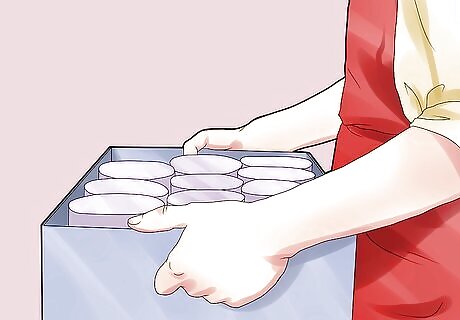
Decide on your Mitzvah project. While you should do mitzvahs every day, this one is special. It should be about something you feel truly passionate about. You should consider your Bar or Bat Mitzvah project a part of tikkun olam, repairing the world. Try to do something big that will make a major impact on your community. Your mitzvah project can be either between you and G-d or between you and your community. A project between you and G-d can be an art project, a scrapbook, a computer program, or a writing project. A charitable project might be a fundraising project, a volunteering commitment, or a charitable program you start yourself.

Plan a charitable Mitzvah project that really makes a difference. If your Mitzvah project is meant to help others, make sure it's an effective form of help. Some charitable projects are more fun for the organizers than they are helpful for the community: be honest as you plan, and commit to actually making a change. Make a list of things you would like to change in your community. Make a list of things you are good at and enjoy doing. Consider how you can apply your time and energy over the long term to make a difference. Ask the adults in your life to help you set up a project that will apply your skills to your passions. Ask your synagogue to help connect you with resources to strengthen your project.

Begin your service project a few months before your ceremony. Earlier is better, but a few months is plenty of time. It doesn't have to finish until after your ceremony, but you need get it started beforehand so that by the time you have your ceremony it is already in place.
Planning the Party
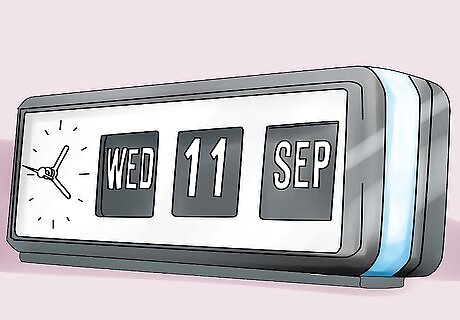
Set a date for your ceremony. Make sure you set the date at least a year in advance. You will need at least that much time to fully prepare for the ceremony and out-of-town guests will need to know the date early in order to make plans to attend. Usually the date is around the time of your birthday (13 for a boy and 12 or 13 for a girl depending on your synagogue), but it doesn't have to be. Choose a date when you are least busy, that might be after school is out or during a break, but be warned that these dates are often the first to be grabbed and some guests may be on vacation. You will be very busy about two weeks before the ceremony solidifying your plans, so make sure you will have time.

Come up with a plan for the reception. Your reception can be anything you want, from a formal party with a DJ and dancing, to a casual sports-and-game day. Whatever it is, try to pick something that you can invite all of your guests to. That means choosing something that isn't too expensive. If you leave some guests out, you might end up in more drama than you can even imagine. Talk with your parents about what you can afford. Reserve a space, or find a house with a big yard and plan to set up there.

Send out invitations. As soon as you know how many people you can accommodate, send out your Bar Mitzvah Invitations so your guests will save the date. Spend some time on the invitations and make them look nice.




















Comments
0 comment